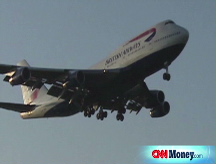Airlines stocks higher as oil falls
Battered airline stocks make gains on slumping oil prices; Northwest blames fuel prices for its earnings loss.
NEW YORK (CNNMoney.com) -- Airline stocks on Wednesday traded higher as oil prices - the industry's greatest burden - plunged.
AirTran Holdings (AAI), the parent company of AirTran Airways, led the pack as its stock surged 25.7%. Shares for other airlines, such as United Airlines' parent UAL Corp. (UAUA, Fortune 500), JetBlue Airways Corp. (JBLU) and US Airways Group (LCC, Fortune 500), also closed more than 10% higher.
The stock for Northwest Airlines Corp. (NWA, Fortune 500), which reported a net loss for the second quarter, traded 15.2% higher.
The price of oil fell as investors became less concerned that Hurricane Dolly, which crashed into the Texas-Mexico border on Wednesday, would disrupt oil production. Light, sweet crude for September delivery fell $3.98 to $124.44 a barrel, after an inventory report showed higher-than-expected stockpiles of crude and gasoline.
Ray Neidl, analyst for Calyon Securities, said the drop in oil prices was largely responsible for gains in airline stocks over the past two days. When oil prices fell on Tuesday, the Amex Airline Index (XAL) shot up 22%.
Northwest Airlines on Wednesday reported a net loss for the second quarter, joining other airlines in blaming the rising price of jet fuel for sending it into the red. Despite the loss, Northwest managed to beat analyst projections.
Northwest - which has agreed to merge with Delta Air Lines Inc. - reported a second-quarter net loss of $377 million, or $1.43 per share. That reflected an impairment charge of $547 million, as well as a gain of $250 million from the successful hedging of fuel prices.
The loss was much worse than Northwest's performance in the second quarter of 2007, when the airline emerged from bankruptcy and reported net income of $2.1 billion. This included $1.9 billion related to reorganization.
Without the impairment charge, the airline said it would have had income of $170 million in the recent quarter.
Northwest did not report its non-charge income in terms of cents per share. But in reporting a gain, Northwest beat the analyst consensus projection from Thomson/First Call, which expected a net loss of 54 cents per share, without charges.
Northwest also said that its operating revenue totaled $3.6 billion in the second quarter, a 12% jump from the same period in 2007. That beat the analyst consensus projection from Thomson/First Call, which expected an 8% gain in revenue to $3.4 billion for the second quarter.
Northwest said the rising cost of fuel was largely responsible for its financial hardships. The airline said fuel costs increased by $637 million, compared to the year before and not counting the savings from fuel hedging.
The carrier said it paid $3.45 per gallon of jet fuel in the second quarter, compared to $2.04 per gallon in the same period last year.
Rising fuel prices have hit the airline industry hard. The Air Transport Association expects the industry's fuel costs to total $61.2 billion this year, up from $41.2 billion in 2007.
Many airlines are raising their fares to offset the rising fuel costs. Fares increased 4.4% industrywide in the first quarter, compared with the same period a year ago, according to the Department of Transportation's Bureau of Transportation Statistics on Wednesday. This is the largest year-to-year increase in nearly two years.
Airlines are cutting costs wherever they can. Northwest, which has lost more than one-third of its stock value so far this year, said July 9 that it was cutting 2,500, or 7%, of its total workforce, and will begin charging a $15 fee for the first checked bag.
Like many other airlines, Northwest is also eliminating its least fuel-efficient flights. By the fourth quarter, the airline plans to reduce capacity by 8.5% to 9.5%.
"The unprecedented rise in fuel prices has had an adverse effect on our second-quarter results," said Northwest Chief Executive Doug Steenland in a teleconference with reporters. But Steenland said that Northwest is now "very well positioned" to face the challenge of higher fuel prices, considering that its pending merger with Delta is expected to close in the fourth quarter of this year.
Steenland said the imminent merger with larger airline Delta "positions Northwest to not only survive, but to prosper in this environment."
Northwest is the fifth-largest U.S.-based airline in terms of annual sales, behind American Airlines' parent AMR Corp. (AMR, Fortune 500), United Airlines, Delta (DAL, Fortune 500) and Continental Airlines (CAL, Fortune 500). ![]()


